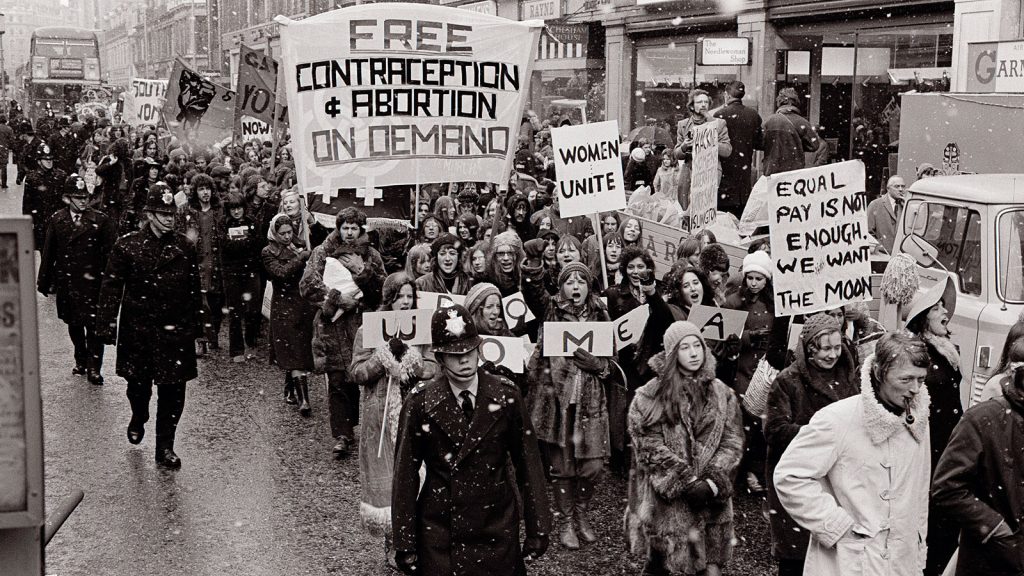Blog Post
After the Revolution: How the West really lost God
By Jonathon Van Maren
My introduction to this series on the 20th century, “The Century that Changed Everything,” can be found here. Part I is “The World Before the War”. Part II, “How the Great War transformed Western civilization–and is still with us today,” can be found here. Part III, “The Second World War: Saving Christian civilization from Hitler’s Reich,” can be found here. Part IV, “The Shoah: The murdered multitudes and the righteous few,” can be found here. Part V, “An eyewitness to the birth of Israel and the Convoy of 35 speaks,” can be found here. Part VI, “America versus the Evil Empire, can be found here. Part VII, “Vietnam: The War that transformed America,” can be found here. Part VIII, “How the last great Christian social reform movement of the 20th century defeated segregation,” can be found here. My essay “The forgotten and misunderstood history of the Sexual Revolution” can be found here.
***
After the cataclysms of the First and Second World Wars and the Holocaust came a sweeping revolution that blew an entire civilizational framework of morality to smithereens in just a few decades. Today, in 2020, entire generations live in utter ignorance of all that previous generations took for granted. They think differently, believe different things, and understand everything around them in ways that would be as foreign to their forebears as their views would be to those in the not-so-distant past. How did we get from there to here? It is one of the most interesting and important historical questions that face us. The chasm of time between those who lived the same lives as their ancestors, generation after generation, and those who live in the eternal, godless present is growing—and soon memories of that past world will fade entirely.
To answer this question, I called Mary Eberstadt, one of the world’s foremost experts on the Sexual Revolution. Her books Adam and Eve After the Pill, Primal Screams: How the Sexual Revolution Created Identity Politics, and It’s Dangerous to Believe are essential primers on the revolution that changed everything, and she is widely recognized as one of America’s leading cultural critics. In fact, Eberstadt believes that the prevailing theories of how the West lost God are almost entirely wrong. To challenge them, she published her response, How the West Really Lost God: A New Theory of Secularization, in 2013.
“I looked at the conventional explanations for secularization, and I found them all wanting in one way or another,” she told me. “So, for example, there is an explanation according to which the West lost God after World Wars I and II, after the decimation of those wars and the Holocaust. How could anyone believe in God after the horrors of the 20th century? That’s one kind of argument that’s out there.” This argument, of course, ignores the fact that nearly all of the 20th centuries great atrocities were perpetrated by regimes that scorned the teachings of Christ and murdered Christians in extraordinary numbers, but that, too, is a fact that progressive historians prefer to ignore. In the Marxist understanding of history, Christians are inconvenient victims.
“The problem with those theories is that they don’t stand up to the historical timeline,” Eberstadt pointed out. “If the wars were the explanation for secularization across the West, then it wouldn’t make sense that we see secularization in vanquished societies, in victorious societies, in neutral societies like Switzerland. So that’s one problem with the explanation from the wars. The other problem is even more fundamental, which is that in fact, World War II was followed by a religious boom from 1945 into the early 1960s across the Western world. And this is not well understood. In societies that we now regard as tremendously secular places—New Zealand, Australia, Canada, etc.—there was in fact a religious boomlet following the war. Why was that?”
Interestingly, Dr. Adrian Gregory, an associate professor of modern history at Oxford University, told me something similar when I interviewed him about the impact of the Great War on Christianity. He had recently completed a research project on religion and World War I and noted that there is no solid evidence for the prevailing theory that the wars triggered the Great Apostasy. It wasn’t until the Sixties, he said, that people began to abandon the churches—after remaining very religious straight through the 1950s. “And then, almost within my own lifetime actually, there is a radical de-sacralization. Even then, you have to allow for evangelical revivals and other complexities. Regular religious worship declines very, very rapidly. But more recently than we tend to give it credit for.”
Eberstadt’s work confirms this—but her theory goes much deeper. “What is the religious boom after World War II all about?” she asked. “It’s about a much more familiar phenomenon, which is, of course, the baby boom—and the baby boom was a pan-Western phenomenon. It was happening in countries across Europe. As one historian put it, Europe was becoming young again in the years after the war. This is not how we think of Europe, especially Western Europe, today. But there were about fifteen years of religious revival and family revival. The baby boom itself didn’t take place in a vacuum. It was preceded by a marriage boom. So I advanced the theory that contrary to these secular theories, the predominant narratives about how the West lost God, if you look at the historical timeline in different places and different cultures, what you see is that religiosity depends on the vibrancy of the family.”
In short, the conventional story of how the West became secular—the slow loss of faith throughout the 19th century brought about by a combination of Enlightenment philosophy, Darwinian scientism, Scriptural criticism, and the death blow of the bloody horror shows of the 20th century—does not stand up to scrutiny. Which is not to say that these events didn’t have an impact on faith—Eberstadt points out that the wars, with their millions of dead fathers and ruptured families, did disrupt religious transmission. The conventional story is convenient for secularists because it posits this idea that people abandoned faith as they became more educated—that Reason essentially displaced the need for God. Not incidentally, this theory was very popular with the New Atheist movement, which offered it as evidence that a great new Secular Age was dawning.
“This idea that we got smart and didn’t need God anymore does not hold up for several reasons,” Eberstadt explained. “One is that there are two many counter-examples to count. For example, in Victorian England and London—and I quote a number of British historians to make this point—it was the best-off and best-educated who led the religious revival and who were far more likely to be found in church and who were far more likely to have families. Again, the point is that these things are connected. So that’s one example of how the dominant idea that we wised up and then we didn’t need God anymore just doesn’t work. The same is true in the US with the Mormons, who also exhibit a pattern according to which the best-off and most educated, who are also the most regular practitioners of the faith, are most often found doing good works, etc. This idea that education drives out God doesn’t hold up.”
One of the interesting historical questions about the Sexual Revolution, however, is why so many parents followed their children in abandoning their commitment to a biblical understanding of sexuality. That young people might rebel in the prosperity following the wars is at least explicable—that the very parents who had made up the marriage boom and then produced the baby boom, while not practicing “free love” themselves, would similarly adopt a new set of moral values is not. As I highlighted in the essay on the Sexual Revolution, over a period of fifteen years, huge numbers of people simply accepted the ongoing revolution as a good thing—or at the very least, something not worth resisting. One answer to this is that the religious faith of those who abandoned the morality Christianity has taught for 2,000 years was simply not deep enough and sincere enough to withstand the cultural currents. Eberstadt has other theories, as well.
“We are perpetually self-delusionary creatures, very good at deceiving ourselves,” she told me. “I think a lot of people thought it would be okay, thought it could be contained, that maybe it was okay to loosen up a little bit for at least a little while. I don’t think anybody, including within the churches, had any idea of how sweeping and ultimately catastrophic the Sexual Revolution was going to be. For those parents who capitulated—here, as always, I think we can never underestimate bullying and cowardice as a subsidiary factor. Cowardice is not a word that people would have used. But of course, a great many people, including inside the churches, caved when what they needed more than anything was to be that sign of contradiction in that moment. I think the preceding generation were by and large bending to peer pressure and hoping that the Sexual Revolution wouldn’t be as bad as it turned out to be.”
It was worse than anyone could have imagined, and for over a half-century now, orthodox Christianity has been locked in mortal combat with the Sexual Revolution. Families, it turns out, are almost always essential for the transmission of religious faith. Fathers and mothers are both incredibly important to the passing on of religious values to children. When the family—the context in which faith flourishes—breaks apart, religious transmission ceases, and secularization begins. “When you have a family that is split, let’s say you have something like alternate custody on weekends,” Eberstadt explained. “You have children in a situation where there isn’t continuity. It’s not the children’s fault. But Mom might like taking them to church. Dad might like taking them to another church. You already have a division introduced that’s going to make the passing on of religion more difficult.”
Another key aspect of religious faith, interestingly, is children. Across human history, Eberstadt noted, “the arrival of a baby is a transcendent fact. It transports ordinary people into contemplation of the metaphysical and the divine. The experience of contemplating, especially a newborn baby or any young human being and being transported into a different frame of mind, understanding that there might be more to this finite world than just finitude—this is a very common experience, I think.” Or at least, it once was. The plummeting birth rate and cratering demographic trends across the Western world after the advent of the pill and the chaos of the Sexual Revolution are, Eberstadt believes, contributing enormously to the Great Apostasy.
“Where does this leave us with the Sexual Revolution? Well, after the revolution, you have a lot less of that,” she told me. “There might be a lot more sexual activity, but there are a lot fewer babies. Partly because of contraception, partly because of abortion, partly because of broken homes, which tend to keep the number of kids down for obvious logistical reasons. You have a lot fewer people who are confronted on some regular basis with the wonder that is created life. At the other end of the spectrum, you’re also confronted a lot less often by death, which I think is obviously another once-ordinary human experience that inclines people toward religiosity. It’s very hard to stand over an open grave and not to wonder: Is this all there is or is this not? But fewer and fewer of us have that experience anymore, in part because it’s not just the nuclear family that collapsed. It’s also the extended family. If you add to that geographical mobility and other factors that attenuate all of these family bonds, you see that the experiences of all of our ancestors, literate or illiterate, are much more textured in a familiar way than most modern peoples today. I think that plays a major role in what we call the decline of religion and what I prefer to call rising religious illiteracy.”
There is more to all of this, of course. A generation of parents who had weathered the Great Depression and fought the Second World War—the Greatest Generation—raised children who grew up, looked around, and decided to throw it all away.
“Some historians would point to all of the popular messages that were circulating—the Playboy philosophy, the Helen Gurley Brown at Cosmopolitan, this sex-all-the-time message that was being pushed out commercially as well,” Eberstadt told me. “That was obviously a contributing factor, but I don’t think was the main factor. What happened is that the pill came along. It was a massive technological shock because for the first time in human history, there was the possibility that women and hence men could know sex without consequence. Nothing like that on the scale that the pill promised had ever happened. Of course, people had always known how to regulate births by abstinence. People had had devices before, but nothing like this flooding of the marketplace with the pill and related technologies. People sort of lost their minds. That’s what peeled away the filial piety. It was that powerful and the peer pressure became that powerful.”
“The more I look at this, the more I come back to the idea of self-delusion. Nobody wanted to believe that this thing should be resisted because it was far too tempting to embrace it. That includes within the churches. Within the churches that have tried to accommodate themselves to the Sexual Revolution, we have also seen collapse. We see the same pattern over and over in Western countries. First comes contraception, adopted en masse. Shortly afterwards, abortion is legalized because it has to be a backstop. Face it, everybody is implicated.”
Speaking with Eberstadt, I was reminded of the words of J.R.R. Tolkien, when he has Galadriel describe her premonition prior to the great battle between good and evil. “The world is changed,” she says. “I feel it in the water. I feel it in the earth. I smell it in the air. Much that once was is lost; for none now live who remember it.”
That is eerily similar to where we are now. “It’s not going to be very many years before nobody can remember what the world was like before the Sexual Revolution,” Eberstadt told me. “That knowledge will pass out of existence, at least in the West. To say everybody’s implicated, of course, doesn’t mean everyone is equally implicated. But there is always the desire to please. I think at least in this moment, for any politician to state the obvious, which is that the Sexual Revolution is responsible for a lot of what ails us in the Western world, would be political suicide. That said, this is a pretty big lie to keep suppressed forever. I think it comes out in very interesting secular ways. For example, if you look at climate change fervor, if you look at the extremes of that movement or sometimes just the run-of-the-mill rhetoric, this movement which emanates from the most desiccated societies in the West and the ones that are burning themselves out fast.”
“Sweden, for example, which is below replacement levels, where there are not robust families, families of size, extended families are a thing of the past, etc. You see these fearful ideas that the world is ending and somebody has got to do something about it and everything is doom and gloom. I think there is a truth to that kind of rhetoric, but it is misplaced. I think the truth is yes, something about the Western world is ending for a lot of Westerners. A lot of Westerners have gone without meaning to it all and radically changed their habitats and cannot live in the way that all their ancestors lived with familial ties and the certainty of religion. So yes, something has gone very badly wrong in the West, and I think different people in the culture pick up on this in different ways. But again, they would not think of applying this to its most obvious object, which is the Sexual Revolution.”
So will the Sexual Revolution abruptly collapse under the weight of its own failures, as some have hopefully predicted? Eberstadt believes that it must, eventually—although she is not sure how many of us will live to see it. We have to recognize, she noted, that this is an unprecedented experiment.
“On the scale that we are witnessing, this experiment of the Sexual Revolution is very new in human history,” she told me. “We have seen examples of family collapse, mainly in aristocratic families from the late Roman Empire, in certain monarchies. We’ve seen family collapse before, but we’ve never seen anything on this scale. So not having answers is not exactly our fault. I know that in my own travels, and I’m sure in yours, you come across people all the time who are pulled into the orbit of Christianity precisely because they are tired of the lowdown, dirty, cramped view of humanity, and they are looking for something better. They know they’re made for something better. I think that a lot of individuals, one by one, are already finding their ways out of this mess. That, too, is a reason for hope. The fact that younger people are increasingly pro-life tells us that at least some aspects of this experiment that we’ve been conducting on ourselves for sixty years have gone far enough now that there is a reaction against them.”
“And I predict there will be more of that to come.”
***
Check out my interviews with Mary Eberstadt on her books Primal Screams and How the West Really Lost God:








